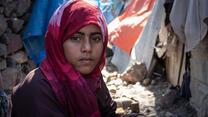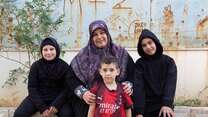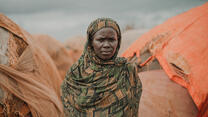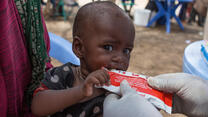The International Rescue Committee (IRC) responds to the world’s worst humanitarian crises and helps people whose lives and livelihoods are shattered by conflict and disaster to survive, recover and gain control of their future. Read the latest crisis updates from our teams around the world.
Quick links: Syria and Turkey earthquakes l Ukraine crisis updates l Afghanistan crisis updates l Drought in East Africa l World's worst crises in 2023
Up to 10,000 people feared missing after devastating floods in Libya
September 12, 2023 - At least 10,000 people are feared to be missing and over 3,000 people killed by extreme flooding caused by Storm Daniel which made landfall on September 10th. The eastern city of Derna has seen the worst of devastation. IRC is carrying out a needs assessment to see how best to support those affected.
Thousands at risk after earthquakes impact Turkey and Syria
February 7, 2023 - As the full scale of the disaster in Syria and Turkey following yesterday’s 7.8 magnitude earthquake and aftershocks becomes apparent, the IRC is warning of catastrophic humanitarian needs in both countries. Unfettered access to those affected is now absolutely critical. As humanitarian needs soar during freezing temperatures, we are launching an integrated response in both countries.
Read our latest statement and an explainer about the earthquake crisis and our response.
How to help after the Syria-Turkey earthquakes
February 6, 2023 - The IRC is deeply concerned for tens of thousands of people who have been directly affected by powerful earthquakes that hit Turkiye, also known as Turkey, Syria, and neighboring countries this morning.
IRC teams are on the ground in Syria and working tirelessly to ensure the safety and wellbeing of those affected. Read our initial statement and check back here for updates.
Authorities in Afghanistan declare ban on Afghan female NGO workers
December 25, 2022 - The IRC is dismayed that the authorities in Afghanistan have declared a ban on Afghan female NGO workers.
Over 3,000 IRC staff in the country are women. Our ability to deliver services relies on female staff at all levels of our organization. If we are not allowed to employ women, we are not able to deliver to those in need. Therefore, the IRC is currently suspending our services in Afghanistan.
The IRC is dismayed that the authorities in Afghanistan have declared a ban on Afghan female NGO workers. Over 3000 IRC staff in the country are women. Our women staff are critical for the delivery of humanitarian assistance in Afghanistan. https://t.co/5eyxgyVdWP
— IRC - International Rescue Committee (@RESCUEorg) December 24, 2022
Universities closed to women and girls in Afghanistan
December 21, 2022 - As the Taliban declares the doors of universities closed to women and girls, the IRC warns that decades of progress for women's education and freedom are being extinguished.
December 20, 2022 - In a chilling step backwards for Afghanistan, universities have been closed to women and girls.
There are no two ways about it: women must be allowed to work and to move freely, and girls must be allowed to continue to go to school. Without their presence in schools and universities, the future of Afghanistan stands to crumble.
Efforts to rebuild Afghanistan in the wake of economic collapse will be undermined completely. Many educated Afghans have already left over the last eighteen months, and the country is in urgent need of a future generation of doctors, teachers and civil servants.
Surging gang violence pushes Haiti into IRC Watchlist Top 10
December 16, 2022 - Haiti moves into the IRC’s Emergency Watchlist Top 10 as gang violence surges in the wake of the 2021 assassination of President Jovenel Moise.
Rising food prices prompted record levels of food insecurity in 2022, which are expected to worsen in the coming year. At the same time, climate shocks and the first cholera outbreak in more than three years are straining critical health and sanitation systems.
Learn more about the crisis in Haiti and other crises on the Watchlist.
IRC spotlights countries facing the world's worst crises in 2023
December 14, 2022 - Each year, the IRC releases a list of the 20 humanitarian crises expected to deteriorate the most over the next year. For the past decade, this report has helped us determine where to focus our emergency services and lifesaving support to make the greatest impact.
In an article published today, the IRC breaks down what you need to know about the 10 countries likely to face the worst humanitarian crises next year. For more information and to see the full list of 20, read the 2023 Emergency Watchlist report or our Watchlist at a Glance summary.
Ebola cases rise in Uganda, IRC launches response
October 10, 2022 - At least 10 people have died from the Ebola virus in Western Uganda. Fears of a widespread outbreak of the deadly virus are rising as more than 40 cases have been confirmed.
The IRC has launched a response, in coordination with the ministry of health, to curtail the spread of the Ebola virus.
“We are concerned about the impact the spread of the virus could have and therefore have teamed up with health authorities to boost awareness, especially to frontline health workers who are more exposed to the virus, as well as improving health facility readiness and linking community responders to the currently running IRC health programs,” said the IRC's Uganda country director, Elijah Okeyo.
The IRC has extensive experience responding to Ebola outbreaks, having delivered responses to the 2014-2016 outbreak in Liberia and Sierra Leone, the 2018 outbreaks in the Democratic Republic of Congo and the 2019 outbreaks in Uganda.
Shipwrecks highlight the need for safe and legal routes to Greece
October 7, 2022 - In just one night, two shipwrecks off the Greek islands Lesvos and Kithira killed 18 people. Between 15-20 more, most of them fleeing violence and persecution to find safety in Europe, are missing or presumed dead.
They join over 170 people who are missing or have lost their lives in the east Mediterranean sea this year alone.
“In the last five years, the number of lives lost at sea among those attempting to cross the Mediterranean to Greece has increased, and the route is now thirteen times more dangerous than it was in 2015,” said IRC Greece Head of Programs, Eftychia Georgiadi. “Condolences and messages of solidarity are not enough….The EU and its member states must urgently expand existing and create more safe, regular routes so that people are not forced to risk their lives on these deadly journeys.”
The IRC teams in Lesvos are on standby to provide relief to survivors or their families, including mental health services and trauma support. The IRC began operating in Greece in 2015 when Europe was experiencing a peak in migration.
Angelina Jolie visits the IRC’s response to the devastating floods in Pakistan
September 26, 2022 - Angelina Jolie visited the IRC’s emergency response operations assisting displaced people in Pakistan. Intense flooding has affected 33 million people and submerged one third of the country underwater.
Ms. Jolie heard the stories of flood victims firsthand and gained an understanding of what can be done to limit suffering moving forward. She will highlight the urgent needs of those affected and the actions required to address the climate crisis destroying lives in Pakistan and around the world.
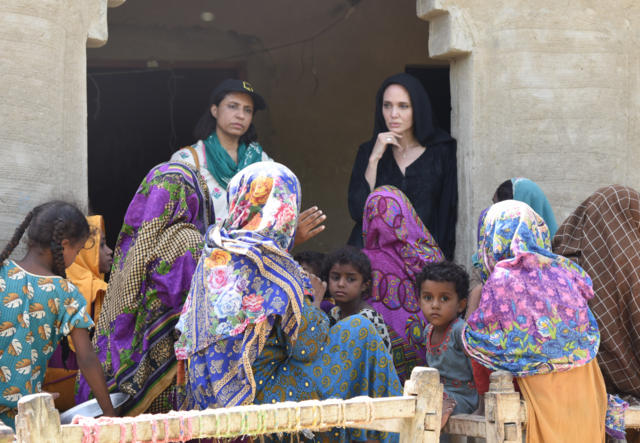
The IRC hopes that Ms. Jolie’s visit will add visibility to the crisis in Pakistan and motivate the international community to take action.
Ms. Jolie is an international humanitarian with ties to the people of Pakistan, having previously visited victims of the country’s 2010 floods and 2005 earthquakes.
Millions of lives are at risk as ‘famine is at the door’ in Somalia
September 5, 2022 - Four seasons of inadequate rainfall have taken the lives of thousands across East Africa and have destroyed access to food for over 36 million people.
Now the United Nations has announced that a ‘famine is at the door’ in Somalia, threatening millions of lives.
“The UN has announced a famine could occur this year - A famine designation will be too late - people are already dying.” says IRC CEO and President, David Miliband, “It is now up to world leaders to urgently step forward to prevent a famine by ensuring committed funds move quickly to implementing partners on the ground and scale up direct funding to NGOs”.
The IRC has been providing humanitarian support to Somalia for over 40 years. Today, over 2,000 IRC staff in East Africa are scaling up programs to address needs across the region.
Find out more about the UN’s warning and the situation in Somalia.
Millions in urgent need after floods in Pakistan and Afghanistan
August 29, 2022 - The IRC has launched an emergency response to the growing humanitarian crisis caused by devastating floods in Pakistan and Afghanistan.
So far, the floods have impacted more than 30 million people, with over 1,000 reported deaths. Damage to over 4 million acres of crops and the death of almost 800,000 livestock will likely exacerbate already devastating hunger crises in some areas.
Despite producing less than one percent of the world’s carbon footprint, Pakistan has been experiencing increasingly devastating climate change-induced drought and flooding. With additional heavy rainfall expected throughout the rest of the monsoon season, urgent action is needed to prevent further damage.
“More than 30 million people, including many Afghan refugees, need our urgent help.” explains Shabnam Balock, the IRC’s Pakistan county director. “The IRC has reached almost 20,000 people with critical food, supplies and medical support. We are urgently requesting donors to step up their support and help us save lives.”
Find out more about the floods and their impact.
Lightning-strike survivor's courage and commitment to refugees
August 18, 2022 - In early August, four people were struck by lightning near the White House in Washington, D.C. The sole survivor, Amber Escudero-Kontostathis, was fundraising for the International Rescue Committee on the day of the strike. After spending five days in the hospital, Amber is persevering through her recovery process and has demonstrated an indomitable spirit through her continued online fundraising efforts.
The IRC is saddened by the loss of three lives in early August. At the same time, we are humbled by the strength and courage Amber has shown the world throughout her recovery.
Bombing of Odessa adds to global hunger disaster
Update – August 1, 2022: The IRC welcomes the first export of Ukrainian grain since February. This shipment is an important first step towards providing relief for the growing global food crisis driving hunger in East Africa and around the world. Why are grain shipments from Ukraine so important?
July 23, 2022 - The IRC is dismayed at reports that Ukraine’s Black Sea port has been heavily damaged in a missile attack less than 24 hours after a deal to release over 20 million tons of blockaded exports of wheat and grain was set to be signed. This could spell disaster for global hunger.
Our statement: 12 hours of hope were a cruel deception; Bombing of Odessa adds to global hunger disaster
3 ways the Ukraine conflict will drive up hunger in other crisis zones
Lifting of Ukraine ports blockade will help ease global hunger crisis
July 22, 2022 - The IRC welcomes the lifting of the Black Sea blockade on Ukraine’s seaports, where 20 million tons of wheat are currently being held. These blockades have greatly contributed to the growing global hunger crisis, especially in East Africa, with countries relying on Russia and Ukraine for over 90% of their wheat imports.
Leading humanitarian orgs commit to increase aid funding
July 13, 2022 -This week several of the largest humanitarian agencies globally made new commitments to improve the quality and amount of humanitarian funding. These build upon prior commitments made with the establishment of the Grand Bargain, an international agreement reached in 2016 to improve the efficiency and effectiveness of humanitarian aid.
"It is encouraging to see the humanitarian community come together to effect long-overdue aid reform, and hold ourselves as a collective accountable,” said David Miliband, president and CEO of the IRC. “We have never ever faced so many in desperate need and never ever had such a shortfall in available resources for saving lives."
World Refugee Day 2022: 100 million people displaced
June 20, 2022 - This past year millions of people in Afghanistan and Ukraine had to flee their homes at a moment’s notice. Meanwhile, crises in countries like Syria, Ethiopia and Venezuela persist, resulting in a record-high 100 million people worldwide who are forcibly displaced.
Now more than ever, people fleeing war and persecution need our support. This World Refugee Day, explore five ways you can welcome refugees.
Get involved on World Refugee Day (June 20) and beyond.
The IRC thanks Harry Styles and Apple for their generous donation
June 6, 2022
From all of us at the IRC: Thank you to @Harry_Styles and @Apple for your generous donation to the IRC.
— IRC - International Rescue Committee (@RESCUEorg) June 2, 2022
Working in more than 40 countries, your support will help us reach even more refugees and people in need in the world’s toughest places. Honored to have your support!
Honored. @HSHQ@Harry_Styles@Applehttps://t.co/T1Cz2cIYpE
— IRC - International Rescue Committee (@RESCUEorg) June 2, 2022
UN: Record numbers of people forcibly displaced
May 23, 2022 - New United Nations data shows that more than 100 million people worldwide are forcibly displaced by war, violence, persecution and other emergencies. Among them are refugees, asylum seekers and people displaced inside their own countries.
Refugees from Ukraine make up 6.4 million of this harrowing statistic, representing the tip of the iceberg when it comes to global displacement.
Learn the difference between refugees, asylum seekers, migrants and immigrants
Let this be a wake-up call to world leaders everywhere: 100 million people have now been displaced due to conflict and disaster.
— IRC - International Rescue Committee (@RESCUEorg) May 23, 2022
Behind the word #refugee is a human being. A human being fleeing in search of safety.
RT if you stand with refugees — today and every day. pic.twitter.com/gXD9YncjDv
Why millions of people across Africa are facing extreme hunger
May 11, 2022 - Drought and conflict have left record numbers of people in the Horn of Africa and Sahel regions in dire need of aid, with women and children facing the brunt of the crises. Learn what's happening in Ethiopia, Kenya, Somalia, Mali, Niger and Burkina Faso—and what needs to be done to avert further suffering.
Over 14 million people in the Horn of Africa are on the brink of starvation — partly due to drought and the war in Ukraine.
— IRC - International Rescue Committee (@RESCUEorg) May 27, 2022
The international community must not leave them behind. https://t.co/OnCMjhEFGc
The IRC calls for an urgent diplomatic solution to the crisis in Ukraine
February 22, 2022 - In the wake of the latest UN Security Council meeting on Ukraine, the International Rescue Committee (IRC) urges all parties involved to de-escalate and avoid a humanitarian emergency.
Ukraine is undergoing its eighth year of conflict with Russia; any significant escalation in fighting would result in soaring humanitarian needs and could lead to one of the largest displacement crises in recent years. Previous rounds of fighting in Ukraine have devastated civil infrastructure, disrupted essential public services, driven food shortages, and led to grave human suffering and displacement. There are almost 3 million people in need of humanitarian aid inside the country, many of whom live in eastern Ukraine where outbreaks of violence are already being reported.
It is vital that all sides meaningfully participate in diplomatic efforts to avert conflict and the suffering it will produce.
Read our February 22 statement
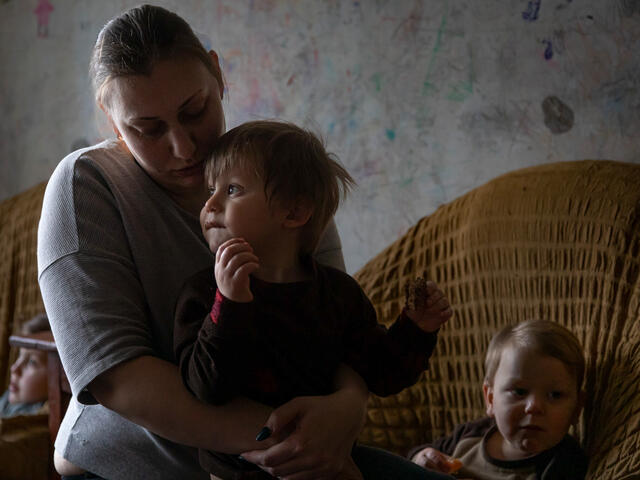
Ukraine: On the brink of humanitarian disaster
February 17, 2022 - The IRC is extremely concerned about ongoing tensions between Russia and Ukraine. The catastrophic humanitarian disaster that could arise from the biggest military land operation in decades cannot be underestimated.
Renewed conflict would result in soaring humanitarian needs, risk civilian lives, devastate civil infrastructure, disrupt essential public services, drive acute food shortages, and lead to grave human suffering and displacement.
As the situation teeters on the brink of war, the IRC is calling for all parties to focus on de-escalation to avert disaster. We are on the ground in Poland assessing the situation and the humanitarian needs that could arise if people start to flee into the country. We will be ready to respond if needed.
IRC response to expulsion of Venezuelan asylum seekers from the U.S.
January 31, 2022 - The IRC responds to recent reports of the current U.S. administration starting flights to expel Venezuelan asylum seekers to Colombia.
Economic crisis, hunger and violence in Venezuela have caused the second-largest external displacement crisis in the world, just after Syria.
Some 6 million people have left the country, 1.8 million of them are now in Colombia.
Read IRC immigration director Olga Byrne's statement
Small window to stop catastrophe as drought grips East Africa
January 31, 2022 - The IRC warns at least 25 million people will face catastrophic humanitarian need in the coming months as drought continues across East Africa. Thousands who depend on cultivation of crops and livestock are already displaced as they move to find new pastures or sources of income and food.
In Somalia, without a scale up of humanitarian aid, almost 30% of the population could see acute food shortages by May. Kenya has declared a state of national disaster with almost 3 million people on the brink of starvation. And malnutrition cases in Ethiopia have doubled during the driest conditions seen in over 40 years.
Somalia and Ethiopia are two of the four countries in East Africa that feature in the top ten crises of the IRC’s 2022 Emergency Watchlist, our list of the 20 countries most at risk of humanitarian emergency this year. The region is emblematic of the “System Failure” we warn about in the Watchlist, whereby states and the international community are failing to confront the global challenges of conflict, climate change and COVID-19, and are instead allowing record numbers of people to fall into humanitarian need.
The IRC urges global leaders and donors to help scale up humanitarian assistance to build resilience to climate change and prepare for further drought.
IRC calls for stronger international cooperation to aid 2.8 million in need in Honduras
January 26, 2022 - As Vice President Kamala Harris prepares to visit Honduras for the presidential inauguration, we call for international cooperation and funding to respond to the humanitarian crisis displacing thousands in the country.
Learn why the IRC’s Emergency Watchlist ranks Honduras among 20 countries most at risk of worsening humanitarian crisis in 2022.
Civilian casualties mount in Yemen
January 26, 2022 - The IRC is extremely alarmed by the rapid escalation of violence in Yemen. We call on global leaders to support de-escalation and vocally condemn all attacks that kill civilians. International efforts must focus on bringing warring parties into peace negotiations and reinstating the Group of Eminent Experts or another similar mechanisms to hold those responsible for violations in Yemen to account.
The IRC's Emergency Watchlist ranks Yemen as one of the top three countries most at risk of deteriorating humanitarian crises in 2022. Learn more about the world's worst crises.
IRC calls for immediate ceasefire after 70 civilians killed in Yemen
January 21, 2022 - Over 70 people, including women and children, were reportedly killed, and over 100 people injured, in an airstrike in Saada on Jan. 20, while separate airstrikes in Hodeidah severely damaged a critical telecommunications center and cut off internet across the country.
“Attacks on civilians are unacceptable," said Stephanie Puccetti, deputy director for programs for the IRC in Yemen. "The latest airstrikes in Hodeidah have not only disrupted communications across the country but also damaged civilian infrastructure, including homes. We have heard reports that civilians have been injured and killed. It’s still too early to understand the full extent of the damage given the communication blackout."
The IRC is appalled by the mass killing of civilians and targeting of the country’s internet infrastructure in Yemen last night where over 70 were killed.
— IRC - International Rescue Committee (@RESCUEorg) January 21, 2022
The IRC is still trying to account for all Yemen-based staff. https://t.co/sIHlMVoQtz
The IRC is still trying to account for all Yemen-based staff. https://t.co/sIHlMVoQtz— IRC - International Rescue Committee (@RESCUEorg) January 21, 2022
World leaders must not turn away from Yemen
January 19, 2022 - As attacks on civilians in Yemen escalate in number, world leaders have turned their attention to other crises.
Alongside the startling rise in civilian deaths and injuries, people continue to be displaced by the actions of all warring parties. Without reinvigorated efforts to secure peace and hold those responsible for violations to account, Yemenis will continue to suffer.
Read our Jan. 19 statement
The IRC's Emergency Watchlist ranks Yemen as one of the top three countries most at risk of deteriorating humanitarian crises in 2022. Learn more about the world's worst crises.
Northwest Syria faces three cold waves in one week
January 19, 2022 - Syrians displaced by conflict have had to endure below-zero temperatures in makeshift shelters as a series of cold fronts grips the Middle East.
In northwest Syria, 2.8 million people are uprooted by violence. Some of them have had to flee their homes up to 25 times. At the same time, an economic crisis partly driven by COVID-19 is forcing families to choose between purchasing food or fuel for warmth.
“We lack all necessities of life from a proper shelter to heating sources and food,” said one man who had been displaced with his wife and children. “It is freezing cold and we need urgent assistance.”
Thousands displaced by fire in Cox's Bazar refugee camp
January 10, 2022 -IRC teams are on the ground providing emergency support to people affected by the Jan. 9 fire in the Cox’s Bazar refugee camp in Bangladesh, which destroyed shelters and vital infrastructure and left around 5,000 people homeless.
The world's largest refugee camp, Cox's Bazar is now home to nearly 1 million Rohingya who fled shocking violence in Myanmar.
Read about our work in Bangladesh
Aid groups in Myanmar speak out on escalating violence
January 3, 2022 - The IRC is one of 14 humanitarian organizations calling for aid workers and civilians to be protected against all forms of violence in Myanmar. From our Jan. 3 statement:
We, the undersigned 14 humanitarian organizations in Myanmar, are outraged at the egregious attack on civilians and aid workers reportedly perpetrated by military forces on 24 December, which also led to the deaths of two aid workers, staff members of our peer organization Save the Children.
Humanitarian aid workers serving communities in Myanmar and in conflict around the globe must never be a target. We stand in solidarity with Save the Children. What happens to one of us happens to all of us.
IRC expands Venezuela crisis response to Ecuador
January 3, 2022 - The IRC is launching operations in Ecuador, expanding our longstanding response to the Venezuela crisis, with the goal of supporting more than 25,000 people within the first 18 months.
Since 2015, more than 400,000 Venezuelans have settled in Ecuador, where they have faced growing obstacles to accessing livelihood opportunities and basic services.
“Life continues to be extremely difficult for Venezuelans, even after arriving in neighboring countries," says Marianne Menjivar, who leads the IRC's Venezuela crisis response ."While Latin American countries like Ecuador have hosted a vast number—despite insufficient international funding and support—a combination of differing immigration policies, overstretched national systems, and the effects of COVID-19 are putting pressure on their capacity to respond."
